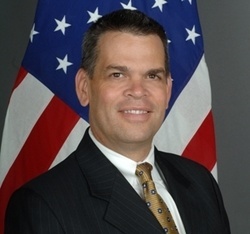
One month ago, I sat in a hot tent on a Harare lawn. It wasn’t a particularly sunny day, and at times, it seemed like it might rain.
Ambassador Bruce Wharton
But, it wasn’t the sun that was generating the heat. It was the palpable, and growing, excitement of over 300 young people.
On January 16, I was part of a panel that was supposed to discuss both the opportunities and challenges facing young Africans. I say “supposed to” because I did not do much talking. Neither did my fellow panelists. Instead, the conversation was driven by the young Zimbabweans in the audience — the students, the entrepreneurs, the activists, the journalists, the musicians, the techies, the filmmakers, the small business owners, the teachers, and the pastors who had travelled from as far away as Mutoko, Masvingo, and Victoria Falls to sit in that hot tent and talk about their dreams for the future.
A young person from Bulawayo was one of the first to speak, “Why can’t we just start something of our own? No more pity parties or waiting for someone else to rescue us.” Another participant urged his peers to stop trying to be employees and start aiming to be employers. Several audience members noted that they had been living abroad for years but decided to return to Zimbabwe, to capitalise on the opportunities here, pursue their personal aspirations, and help their communities.
Sitting next to me on the panel was Macon Phillips, a fellow US State Department official and former advisor to President Barack Obama, who was making his first official trip overseas and his first ever trip to Africa.
During his time in Zimbabwe, he met with several groups of young leaders and learned about their technology ventures, the media organisations they had founded, the ways they used art to educate youth, and their solutions to everyday problems.
“One of the things that’s most frustrating to the people I have spoken with is just how misunderstood Zimbabwe is by the rest of the world,” he said.
- Chamisa under fire over US$120K donation
- Mavhunga puts DeMbare into Chibuku quarterfinals
- Pension funds bet on Cabora Bassa oilfields
- Councils defy govt fire tender directive
Keep Reading
It’s true that Zimbabwe is known for record hyperinflation, disputed elections, and a dramatic downturn in agricultural productivity. But, that’s not the whole story. Zimbabwe is also full of promise. Its people are among the most educated on the continent.
According to 2012 statistics from the World Bank, it has the highest literacy rate in Africa. And, most importantly, it has young people that are not daunted by current capital constraints, by irregular power, or by the dearth of formal employment opportunities.
Zimbabwe has the type of young people who stand up, in a tent full of their peers, to say “challenges prompt creativity,” and entrepreneurs, like another fellow panelist, who urge youth to create their own opportunities.
For the past 34 years, my government has supported programmes that both provide immediate aid and build capacity, enabling Zimbabweans to realise their full potential.
‘Sound economic policies needed’
Zimbabweans hold their future in their own hands. In 2013, Zimbabwean students obtained nearly US$12,4 million in scholarships for undergraduate education in the US.
This money was not aid provided by my government; these funds were awarded by American colleges and universities who saw in each admitted Zimbabwean an eager mind, a persevering spirit, and a desire to shape his or her community.
These academic institutions saw what I see every day; that Zimbabweans can change the future of their country, by creating their own companies or investing in a social enterprise, by pushing for democratic reforms or advocating for sound economic policies.
Let me be clear. Zimbabweans face challenges and those challenges can only be overcome through the implementation of sound policies. Zimbabweans need capital to launch and expand their businesses and so they need transparent, predictable policies that attract foreign direct investment.
Zimbabweans need to commercialise their ideas and their art and so they need strong protection of their intellectual property. Zimbabweans need rule of law, secure property rights, and clear tax structures.
Zimbabwe’s full potential will not be realised until it implements economic policies that simultaneously protect national interests and facilitate foreign investment to allow Zimbabwe to fully utilise its tremendous human capital. This is not impossible.
Sitting in that tent listening to youth from around the country encourage their peers and express optimism about the future bolstered my already strong faith in the people of Zimbabwe. They were hopeful and ambitious, but most of all, empowered and full of agency.
They understood their potential as individuals and power in numbers and recognised what I have been saying, that Zimbabwe’s economy is, in fact, in the hands of Zimbabweans. As one young person noted, “don’t just curse the darkness, light a candle.”
Ambassador Bruce Wharton is the US Ambassador to Zimbabwe since November 15 2012.










